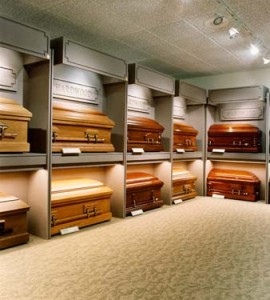Choosing Caskets
Key Considerations When Choosing Caskets
Making funeral arrangements can be extremely stressful and, adding to the grief and loss and emotional turmoil, is the fact that you have to swiftly decide on a number of important details. One of these details will be selecting from the various types of caskets.
Arguably one of the most difficult financial and emotional decisions families will face is choosing from the wide variety of caskets. And even more challenging is having all of the family members and loved ones involved unanimously agree on the appropriate amount of money to spend on a casket.
See Our Helpful Tips When Choosing Caskets:
Different Types, Sizes, and Prices of Caskets
Casket prices widely vary, and are mostly determined by their composition, hardware, and the size of the casket. However, many funeral professionals will caution you that another important factor in the price of caskets is where they are actually purchased. The prices of caskets can vary widely according to the particular state, funeral home, and cemetery.
Wooden caskets come in a variety of different color and types of wood, such as oak, mahogany, cherry, poplar, maple and ash. Wooden caskets can be constructed of solid wood or also wood veneer. Wooden caskets can also be hand-sculpted and meticulously polished to a high gloss or satin finish.
Metal caskets are usually made of 18 gauge, 20 gauge steel, or stainless steel. These metal caskets are also available in just about any color families prefer. There are also metal caskets you can choose which are made of bronze, copper, or stainless steel.
Casket sizes can also vary, mainly as a result of the age and size of the deceased. Important to remember is that if you need an over-sized casket, mask sure you ask if it will fit into a standard sized vault, or if a larger vault will be needed. This is particularly important given the fact that there are some cemeteries which actually require the use of a vault.
What is the Purpose of a Burial Vault?
The main purpose of burial vaults is to protect a casket (or urn) once it has been buried in the ground. So what burial vaults actually do is act as a large protective container for caskets and urns, insulating them from things such as the ever-changing weather elements.
In addition to protecting caskets or cremation urns, burial vaults are also used to conserve and protect the cemetery. The reality is that over time heavier caskets can settle into the ground, which ultimately causes the ground above to become unstable. So as we mentioned above, it is this reason that some cemeteries actually require a burial vault. In addition, it is also important to note that burial vaults are not required and generally an optional accessory which can be an additional purchased if desired.
Choosing a Casket When There is a Cremation
Cremation is also becoming an increasingly popular option today. In the case where cremations have been agreed upon, then the price of a casket becomes much less of a factor. The reason is mainly because this is the actual vessel that will be cremated along with the deceased. Also important to remember is that, although caskets used for cremation are usually less expensive and usually less attractive, most families will choose to drape the casket with an attractive cloth of their choice during the actual visitation or memorial services.
Why Was The Funeral Rule Created By the FTC?
The Funeral Rule, which was enacted by the Federal Trade Commission (FTC), was created for the purpose of reducing or eliminating the large mark-ups that were taking place in selling caskets. As a result, families today have the option to actually purchase a funeral casket on their own. According to The Funeral Rule, funeral providers are bound by federal law to accept any casket purchased from an outside source, and they are also not allowed to charge a “handling fee” to accept any caskets.





